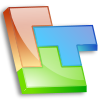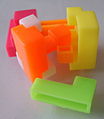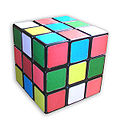- Puzzle
-
"Puzzle solving" redirects here. For the concept in Thomas Kuhn's philosophy of science, see normal science.
Part of a series on Puzzles  Types
Types- Guessing game
- Logic puzzle
- Dissection puzzle
- Induction puzzle
- Logic grid puzzle
- Self-reference puzzle
- Mechanical puzzle
- Puzzle video game
- Transport puzzle
- Word puzzle
- Metapuzzle
A puzzle is a problem or enigma that tests the ingenuity of the solver. In a basic puzzle, one is intended to put together pieces in a logical way in order to come up with the desired solution. Puzzles are often contrived as a form of entertainment, but they can also stem from serious mathematical or logistical problems — in such cases, their successful resolution can be a significant contribution to mathematical research.[1]
Solutions to puzzles may require recognizing patterns and creating a particular order. People with a high inductive reasoning aptitude may be better at solving these puzzles than others. Puzzles based on the process of inquiry and discovery to complete may be solved faster by those with good deduction skills.
Contents
History
The first jigsaw puzzle was created around 1760, when John Spilsbury, a British engraver and mapmaker, mounted a map on a sheet of wood that he then sawed around each individual country. Spilsbury used the product to aid in teaching geography. After catching on with the wider public, this remained the primary use of jigsaw puzzles until about 1820.[2]
By the early 20th century, magazines and newspapers found that they could increase their daily subscriptions by publishing puzzle contests. Puzzles may also include letters, numbers, shapes, and riddles.
-
A puzzle undone, which forms a cube.
-
An example of a British-style crossword puzzle.
Contemporary puzzles
A sample of notable puzzle authors includes Sam Loyd, Henry Dudeney, Boris Kordemsky and, more recently, David J. Bodycombe, Will Shortz, Lloyd King and Martin Gardner.
There are organizations and events catering to puzzle enthusiasts such as Ravenchase, the International Puzzle Party, the World Puzzle Championship and the National Puzzlers' League. There are also Puzzlehunts like Maze of Games or the Rittenhouse Chronicles.
The Rubik's Cube and other combination puzzles are toys based on puzzles that can be stimulating toys for kids and are a recreational activity for adults. Puzzles can be used to hide or obscure objects. A good example is a puzzle box used to hide jewelry.
Games are often based on a puzzle. For example there are thousands of computer puzzle games and many letter games, word games and mathematical games which require solutions to puzzles as part of the gameplay. One of the most popular puzzle games is Tetris.
A chess problem is a puzzle that uses chess pieces on a chess board.
Types of puzzles
The large number of puzzles that have been created can be divided into categories, for example a maze is a type of tour puzzle. Other categories include construction puzzles, stick puzzles, tiling puzzles, transport puzzles, disentanglement puzzles, jigsaw puzzles, lock puzzles, folding puzzles, combination puzzles and mechanical puzzles.
- Lateral thinking puzzles, which can be open ended and sometimes referred to as situation puzzles, or 'closed' lateral thinking puzzles which are designed to have only one correct and obvious answer.
- Logic puzzles using a chess board, such as Knight's Tour and Eight queens.
- Mathematical problems such as the missing square puzzle. Many of these are "impossible puzzles", such as the Seven Bridges of Königsberg, Water, gas, and electricity and Three cups problem. See List of impossible puzzles.
- Mathematical puzzles
- Mechanical puzzles such as the Rubik's Cube, Soma cube, Tower of Hanoi, Burr puzzle and impossible bottles.
- Meta-puzzles are puzzles which unite or incorporate elements of other puzzles. It is often found in puzzlehunts.
- Paper-and-pencil puzzles such as Connect the dots and Nonograms, and the Logic puzzles published by Nikoli: Sudoku, Slitherlink, Kakuro, Fillomino, Hashiwokakero, Heyawake, Hitori, Light Up, Masyu, Number Link, Nurikabe, Ripple Effect, Shikaku and Kuromasu; see List of Nikoli puzzle types
- Peg solitaire
- Picture puzzles, such as sliding puzzles like the fifteen puzzle; jigsaws and variants such as Puzz-3D.
- Puzzle video game
- Sangaku
- Sokoban
- Spot the difference
- Tangram
- Word puzzles, including anagrams, crosswords, word searches and ciphers.
Etymology
The 1989 edition of the Oxford English Dictionary dates the word puzzle (as a verb) to the end of the 16th century. That first documented use comes from a book called The Voyage of Robert Dudley...to the West Indies, 1594–95, narrated by Capt. Wyatt, by himself, and by Abram Kendall, master (published circa 1595).
Their research, based on the "chronology of the words, and still more the consideration of their sense-history, seem[s] to make it clear that the verb came first, and that the noun was its derivative."
Related categories
- Category:Puzzle books
- Category:Puzzle designers
- Category:Puzzle video games
See also
References
- ^ Kendall G., Parkes A. and Spoerer K. (2008) A Survey of NP-Complete Puzzles, International Computer Games Association Journal, 31(1), pp 13-34
- ^ Puzzle History
- Creative Puzzles of the World, 1980, Plenary Publications International
- Denkspiele Der Welt, München 1977,1981, Heinrich Hugendubel Verlag
External links
- The Jerry Slocum Mechanical Puzzle Collection Presented by the Lilly Library of Indiana University.
- The puzzle archive of the rec.puzzles newsgroup
- Puzzles at the Open Directory Project
Categories:- Problem solving
- Puzzles
Wikimedia Foundation. 2010.




